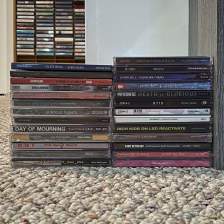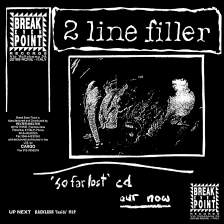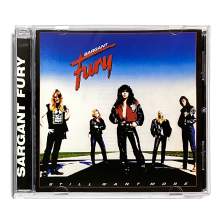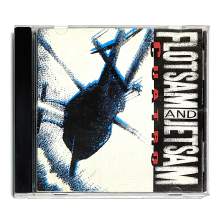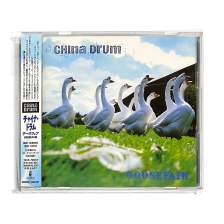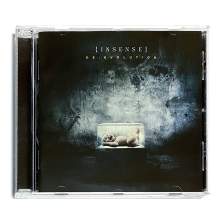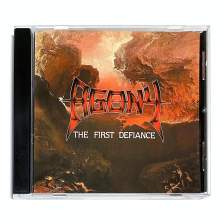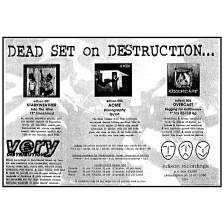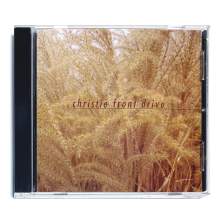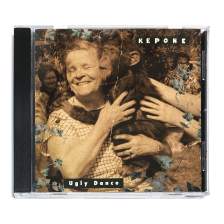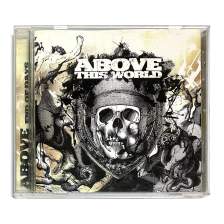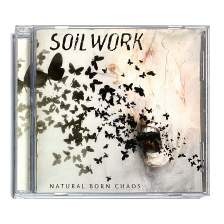I've referred to This Sect's debut full-length, Shake the Curse, as "dark yet catchy post-punk that's a must-listen" (here's the full review). And I mean it. The album's out now, and I wholly encourage fans of the genre to seek it out with great rapidity.
Enough said.
Without further ado, here's my conversation with the band's always entertaining frontman, Gøran Karlsvik.
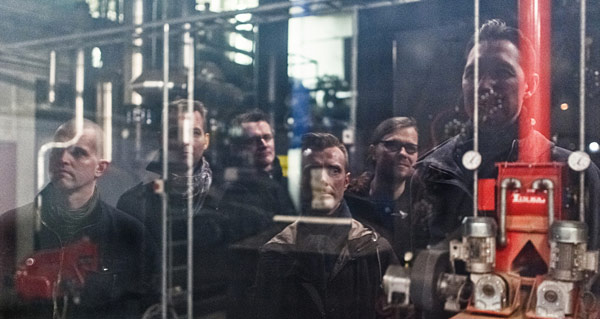
Seven years passed prior to the release of Shake the Curse, and it sounds like there were some personal hardships along the way. Was the band derailed at all during that period, or was it really just a long, arduous process working on refining the material for your debut full-length?
The band was never derailed. Up until then we had been quite (hyper)active. Our formative years as a band resulted in three EPs and a live album, all released within a relatively short timespan. We were also quite proficient with gigs around Scandinavia. In between all this, we made lots of babies and had full-time jobs. Full steam ahead! When the recording process started, that's when the hardships started to mount up. We lost some people that were very close to us along the way. There were some funerals. But bad stuff only brings us tighter. We're as much a support group as a band, I guess. Getting together and letting the frustrations run amok through creative outlets has always meant a lot to us. The negativity of that period helped fuel the overall vibe of the album. It was a cleansing process, a catharsis.
In another interview, Ole Andreas commented that "the album is totally different now compared to how it would have sounded in 2009/2010." How would it have sounded back then? Was time the only factor in the continual metamorphosis of the music?
If we'd finished the album during that particular time, I guess the end result would've been more raw and spiky. I think that the initial idea when we went into the studio this time was to capture the live energy. We've always been a bit more abrasive live than on record. But being in a recording process has, in the past, not always been comfortable. We've felt rushed, stressed out. This time we took our sweet time, partially due to the personal struggles within the band. We kind of closed ourselves off to distractions, barely playing shows, only spending band time in the rehearsal space and in the studio. We did some occasional nice gigs, like the support slot for Cursive, though.
What would probably have been a pretty "punk" album turned out more introspective, refined, detailed. We learned to use the studio as a tool. Layering things, experimenting with the sound, adding atmosphere. Gunnar Kjellsby, our producer, was a huge help along the way. He was always on the same page, and also pushed us to try out different palettes sound-wise. I'm glad we didn't rush anything. I'm pleased with every nanosecond of it.
The 2005 recording of "Party Like it's 1939," while obviously the same song, certainly leans more on the angular/indie side of things—as opposed to the darker, post-punk edge represented by the bulk of the new album. What influenced the shift towards this darker direction, or was it just a natural tendency?
While we certainly liked the original recording of "Party Like it's 1939," we felt that there was something missing in the sheer performance of the song. The original was too hectic, too tinny-sounding. We wanted a more moody piece, kind of how we performed it live, and felt the song could turn out better than the first time around. I've always found that particular song to be one of our most lighthearted ones, it being a celebratory tune about burning bridges, and all.
We might revisit more "golden oldies" in the future. We've added obscure early songs from our more "hardcore" era to the live repertoire, and are remodeling them for a future recording session.
Beyond the fine-tuning and re-recording of older songs, can you talk about the band's overall migration towards a darker musical approach?
That particular "shift" was a natural evolution of sorts. This Sect is not about stagnation, we want to evolve as a band. We've never had a "game plan" regarding our genre orientation, but eventually, things will start to settle into some kind of format over the years. We're not exactly doing abstract improv jazz fusion, you know? At the end of the day, it's only rock 'n' roll (but I like it). As previously mentioned, the Shake the Curse studio era was not a good time for some of us, on a personal level. That definitively went into the sound, both intentionally and unintentionally. A combination of higher production values and more focused songwriting also played into things. We really went for the details.
Up until Shake the Curse, we'd been through a continuous process of trying to figure out our musical direction. I guess there were more elements of both indie rock and post-hardcore in the mix back then, but I suck at reviewing our own stuff, I'm too close to it. Post-punk was always at the core of what we do, the common denominator, and I feel that those leanings have now been refined into a more coherent vibe. It's such a cliché, but I think that with this album, we finally "found our sound." "Bookburner" is a good indication of what future material might sound like, but new jams are all over the place, as they should be, with nods to both krautrock and doom. Not kidding. Maybe we're exploring some heaviness, after all?
You've mentioned coming from a metal background in your younger days. What about the rest of the band? Did everyone follow a similar path, or no?
There are some similarities. Both Ole Andreas (guitar) and Øystein (bass) are huge metalheads, with a really wide range of tastes. They've both been following the evolution of black metal throughout the years, which is probably a quite natural reaction, being Norwegian and into metal. Ole Andreas leans a bit more towards the Godflesh angle of things, with a flair for the post-metal stuff. Øystein is very much into hardcore as well as metal, but he also digs doom and straight up hard rock. Fun fact: he's got a Blue Öyster Cult tattoo! Klaus (drums) is pretty punk and into noisy stuff, but metal doesn't enter his equation. Are (synth) was heavily into hip-hop throughout his formative years, then became super fascinated with indie, synth-pop, and post-punk. That's how I got to know him, actually. Thomas (guitar) is infamous for having played in the Swedish indie rock outfit Sly and Dolph. His preferences are all over the place, but it's mainly indie-tinged stuff that gets him going. Summary: we're a schizo gang, but we've really bonded through our common love for the post-punk sound. Music lovers, first and foremost, not genre purists.
For you personally, what did that expansion of influences look like? How did you grow from metal into hardcore/punk, and eventually start opening up to styles such as synth-pop, etc.? Do you recall what was your first exposure to the types of music that you eventually started to build upon in This Sect?
Well, being a small town boy, I was never part of any "scene," because no scene existed. We created our own tapestry of weirdos instead, loosely tied together due to our interests in "outsider stuff"—comic books, horror movies, video games, leftfield music, skateboarding, etc. It was simply a thing born out of curiosity.
At 19, I moved from a place with no gigs at all to a place with gigs every night. I visited the "scenes" that interested me, and my discovery was mostly one of disappointment. Each scene was a hermetic microcosmos where people only listened to a set amount of bands, whether it was the hardcore crowd, the indie crowd, or the synth crowd, they didn't seem overtly interested in new discoveries or learning about music history, it was mainly about the fashion aspect. Which I totally get, it's nice to play dress-up every once in a while. But I'm a nerd, there's just too much music out there, and I want to check it out, whether it's necrotique sludge grindpunk, post-noise electro twee or ambient dreamgaze bubblegum. The metal scene has, however, always been a really comfortable place to hang out. Metalheads tend to be mellow, fun, and with eclectic tastes. I like certain aesthetics of metal, it's in my DNA, somehow. I never really felt the urge to make metal music myself, though. I'm happy with being an avid listener.
Metal just happened to be one of the first things I discovered. Mid-'80s. I remember getting three Iron Maiden records from my brothers during the same week when I was maybe 8, but around the same time also getting A-ha's debut, Let's Dance by David Bowie, as well as albums by Devo, Kate Bush, Talking Heads... That was the pop music of the time, lucky me. So there was always this dual identity going on, from the very beginning. There was simply too much cool music out there to limit myself to one singular genre experience. I still get into very specific moods, where I binge into a certain genre or period for days and days.
In my formative metal years, thrash was my main hang-up. Especially Anthrax and Slayer. And thrash being "crossover" and all, it led up to discovering some hardcore bands, first and foremost those with really recognizable logos, like Dead Kennedys and Black Flag. Skateboard culture helped, Thrasher magazine had lots of exciting ads for bands I would check out because they had cool names. Millions of Dead Cops? Sold! Also, the escapism on offer in metal wasn't as interesting anymore. Heavy metal never felt "real" to me, I couldn't relate to it, except as an aggressive outlet. Barbarians and dragons, I got my dose of that through my other interests in geek culture, like comic books. Hardcore punk had the aggression, certain personal themes that interested me, as well as thoughtful stances regarding animal rights, self-discipline, and anti-fascism. By the time black metal got huge in Norway, I had lost most of the interest in metal music. For a while. As we know, the '90s were not so kind to mainstream metal. I was by then heavily into "indie," and also got increasingly interested in both hardcore and noise rock, especially the Amphetamine Reptile stuff. I have this thing where I can get fixated on certain labels; I discover a band that I like, I check out which label they're on, then check out the other bands on that label. That was how I got into Dischord; listening to Minor Threat and Fugazi, then checking out the other bands on the roster. All in all, the DC hardcore scene was a huge inspiration.
The main trait with my genre confusion, I think, is that I've always gone for the oddballs, never the plainest examples. Even though I love hardcore, I never got into NYHC—too macho for me. I like some brains with my brawn. Off the bat, some hardcore/punk faves, past and present: City of Caterpillar (and all related projects), Modern Life is War, Fugazi, Nomeansno, Portraits of Past, The Locust, Black Flag, At the Drive-In, Converge, Dead Kennedys, Neurosis (Souls at Zero!), Circle Takes the Square, Drive Like Jehu, Antioch Arrow, Botch, Dangers... the list goes on and on.
The synth-pop phase came quite late, in my early-20s. It was just me basically expanding on the nostalgia of my childhood, trying to rediscover some half-forgotten sound of the '80s. The warm analog keyboard sound, coupled with the cold, disaffected performance... so exciting. John Foxx is a prime specimen. A lot of that was also quite connected to the post-punk era, which I was already into, being more than modestly interested in anything related to punk.
I was 26 when I joined This Sect. By then, all of my music phases had been long since entwined into each other. I didn't follow any particular genre whim. I had no idea what kind of music we were going to make, and I loved that idea. All of the stuff I had absorbed musically up until that point would feed into This Sect, in some way or another. A culmination of sounds.
When you wrote about Q: Are We Not Men? A: We Are Devo! for No Echo a while back, you cited an appreciation for Devo's subversive qualities. How does that sense of subversion lend itself to the context of This Sect's aesthetic?
Hmmm. Well, I guess we've never done things the easy way. We've always been very into a certain aura of mystique regarding the band, presenting it (sometimes quite jokingly) as more of a concept than a regular band. For many years we used pseudonyms, a thing that actually began as a fun way to escape fines for illegal poster activities from the Oslo City Council.
The lyrics have lots of hidden themes. I try to write lyrics in a way that hopefully makes them work as "rock lyrics," with their hooks and slogans, but still lets them stand out. Everything is still very personal, and might mean something quite specific to me. Small mysteries, riddles within riddles. Hopefully listeners can get their own spin on them. I'm more into presenting an atmosphere and a mood than a specific message. Give the brain something to chew on. Hearing how other people interpret the lyrics can often be more rewarding and inspiring than my own personal experience. Our songs have lots of little "Easter eggs," small homages in the riffs, unexpected twists and turns, etc.
Did your "illegal poster activities" just consist of flyering to promote live shows, or did the posters happen to be some form of cryptic street art/sloganeering?
We were fined for putting out flyers, stickers, and posters to promote shows. Did the promotional material have some sort of cryptic sloganeering going on? Lots. That's part of the fun. Turned out, having secret identities within the band only made the Oslo City Council send the fines directly to the clubs we played. Not a good move. We accepted the fines, like good upstanding citizens. The City Council had a zero tolerance thing for poster activities going for a while, probably to pave the way for having Clear Channel put up stupid billboards all over town. Now that's subversive!
Do you always use William S. Burroughs' cut-up technique for crafting your lyrics? I've been intrigued by that concept as well. Have there ever been instances in which this approach has changed the "meaning" of a song, or actually pointed you in another direction—at least in terms of your own personal interpretation of a lyrical theme?
No, not so actively these days. But in my very beginning as a lyricist, the cut-up technique really got me started. Not only did it make "poetry" seem exciting, but it was also a very helpful way to discipline myself as a writer. Any idea worth writing down was kept, and stored away for some later purpose, which often came in handy. I guess there have been lots of instances where the cut-up technique has altered the direction of a song, as I rarely set out with a singular motif when writing the lyrics. "Copulation Control," from Shake the Curse, is a good example of that. The song kind of started out as a joke, but now I consider it a really disturbing little art punk piece that splinters out into several different directions, and quite misanthropic ones at that.
Nowadays I tend to write long "rants," which I keep editing down, often during the course of jamming out new tunes, until they fit within the rhythm and the framework of a song. The Burroughs technique still pops up, though, as some old phrase might reoccur in the back of my head, as the final piece in the puzzle. Jigsaw lyrics.
You've been self-releasing your material through Sect Appeal Records pretty much from the start, right? Did you know all along that was the route you were going to take, and has there been a benefit to handling the majority of that aspect of the work yourselves?
Creative freedom is of course a huge benefit, being control freaks. The economy side of it all? Not so beneficial, ha, ha. We are all in some way or another submerged in D.I.Y. culture, so self-releasing seemed pretty natural to us. Also, the band members all have some form of media jobs, which helped us understand certain basic marketing stuff. We've had various distro deals on some of our releases, letting us branch out a bit. An ordinary "label deal" seems interesting enough, but seeing how the music industry has collapsed and evolved during the past few years, I feel that we've been quite fortunate with how being D.I.Y. has treated us. Chances are that if we'd signed to an "ordinary" label a few years back, that label would be long gone now, getting our releases trapped in some kind of logistical flux. Right now, we're happy with having released Shake the Curse exactly the way we wanted to, and also with having a very good distribution deal in Norway through our favorite record shop, Tiger.
A few months ago, Avi Roig from It's a Trap/Harsh R put together an amazing list of Scandinavian post-punk bands for No Echo. In my opinion, This Sect could easily have a home on such a list, so I was wondering if there are any Scandinavian post-punk gems that have inspired you, or that you would particularly recommend to people like myself that are fairly inexperienced with this genre?
Okay, here are some pointers to contemporary and not-so-contemporary Norwegian music related to post-punk. Our old pals Hope I Die Virgin and Monomen (R.I.P.) come to mind. The second album from The White Birch, People Now Human Beings, from 1998, might not fit into the post-punk stereotype, but it's a perfect fucking album that more people should check out. Ole Andreas' other band, The Murder Mystery, does super catchy, minimalist post-punk. Duo format with a drum machine, reminiscent of Interpol and I Love You But I've Chosen Darkness, which they've also done support for.
The great De Press, freaky post-punk/new wave from the early-'80s. Frantic stuff, starring the Polish agent provocateur Andrej Nebb, kind of like a proto-David Yow, in a way. Nebb's second band, Holy Toy, was also awesome and super weird. The Aller Værste, The Cut, and Kjøtt from the same era also really helped push the envelope. Not to mention creepy art punks Munch. Check out the collection Maskindans: Norsk Synth 1980 - 1988 for a quick introduction to the Norwegian synth/post-punk scene of the '80s. 41 tracks, two CDs.
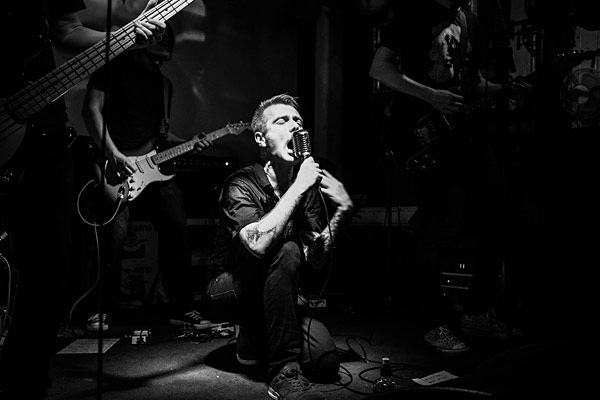
You're working on a book about capital punishment in Norway. What inspired the project, and how far along are you? Will this be your first effort? If not, what's your history with regard to that avenue of your writing?
The project started out as a more localized idea, about nasty little secrets in our urban surroundings. I lived near a park that used to be a cholera mass grave, and also at some point next to an old execution site. I wanted to explore the stories behind our surroundings, basically. The publisher liked some of the ideas I presented, but wanted a more "universal" and focused spin. I refined it as a more general book about the history of capital punishment in Norway, from the feeble beginning as a state governed by law in 1274, up until the abolishment of the death penalty in 1979. Ironically, it was the dawn of our "civilized" era that brought forth a system in which capital punishment was one of the pillar stones... I certainly wasn't an expert on the subject, but I've always found it very interesting, and got heavily invested in the research. It's written with a certain morbid sense of humor, and explains the various circumstances in a pattern that might appeal to the "everyman," not only academics. Books on heavy subjects can be hard to absorb, but I don't think mine is. My hope is that some teenagers can get into it.
I recently finished the first draft, hopefully the editor is happy and we can move on to the next draft ASAP. Planned release: spring 2015. It's my debut as an author. Before this, I've worked as an editor for comic books and magazines, and also as a writer, translator, proofreader, etc. I'm always writing stuff, working on book ideas, both fiction and non-fiction, TV pitches, lyrics, etc. This autumn I'm starting work on a TV series, as a scriptwriter. No darkness whatsoever in that project, however. Pure comedy.
Is there any more you can share about the TV series and how that opportunity came to be? Sounds like yet another interesting way for you to spend your time!
Bit too early in the process to tell, but me and a really talented director friend (Hi, Kenneth!) have been working on various TV pitches for a while. He made a pilot for this hilarious idea he had, and got it green-lighted by the Norwegian Broadcasting Corporation (NRK). He then let me in on the team, where I'll be his assistant monkey/script guy/ideas man. We're making a full season of the show, called ZAP!, where we'll be "remixing" classic NRK archival stuff. A nostalgic bad trip for the YouTube generation, with a notoriously short attention span, lots of bad puns and silly overdubs.
And, finally, if This Sect was literally a sect, what would be its overarching ethos?
We'd be an apocalypse-worshipping party sect, with the practical compounds of the survivalist nuts, the strict dress code of Jehovah's Witnesses, and a hidden agenda to bring back the elder gods of the Cthulhu Mythos. We could have slogans like "END TIMERS IN END TIMES," "PARTY LIKE THERE'S NO GOMORRAH," "WAKE UP WACO," and would totally crush the Westboro Baptist Church in the music biz.

